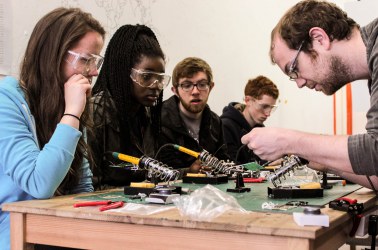Andrew Whittington-Davis
The importance of innovating with citizens is becoming more prominent as times goes on, allowing policies and technologies to better represent the values of society. The methodology of co-creation was not grounded as one of the main pillars of RRI (Responsible Research and Innovation). Instead, the term ‘public engagement’ was used as the phrase when referencing participatory activities. Providing a space where citizens can become the decision makers is widely viewed as being necessary for the future of science and technology and this is where the Commission seems to be moving towards in the next framework programme Horizon Europe.
However, over the past 5 years, the European Commission has funded 48 projects that looked at implementing RRI further, but consistently, projects often fell towards a consultation format – where views and opinions of the public were passed towards the sponsors of the event. How can we begin to encourage co-creation in projects further – where knowledge is not only passed on but shared between the public and sponsors, with new information and ideas being co-created together? To answer this, one of the tasks of University College London (UCL) was to produce a document adapted from other RRI projects outlining co-creations potential as a means for public engagement and the challenges still facing it. That way, the future of co-creation can be more defined for SISCODE and other EU projects.
This document outlined four main findings (amongst others) that hindered the progress and use of co-creation methodologies:
1. Citizens need to lead the innovation: Citizens are often consulted to about their ideas, values and visions. However, the final decisions still often sit with the policy-making and scientific communities. Being open and transparent with citizens on how their views will influence the final decision is paramount. Ultimately, the citizens need to be in the driving seat.
2. Co-creation needs to be embedded as a norm in organisations: This at first, seems difficult, but a number of suggestions were recommended to achieve this. The main suggestion is to build co-creation into research funding criteria by considering the researcher’s participation in using co-creation as a means for knowledge creation. It is vital that we make this form of methodology a fundamental aspect within scientific research.
3. We need to step away from the desire to do more knowledge dissemination: There is often a repeated call to bring back elements of the deficit approach. But, the use of co-creation methodologies asks us to do more than just problematise the public’s knowledge deficit. Instead, the science instead should be problematised, with a focus on redistributing the power held amongst the stakeholders.
4. Context is important: Every co-creation event is not analogous to one another. The topic being discussed, the people and culture involved, the location, and the time of the event, all effect which specific methodologies should be used. One size does not fit all.
The lessons learnt from this research has helped map out the elements hindering co-creation and has assisted with the next stages of the SISCODE project. Taking into consideration how things are moving within Horizon Europe we fully recommend accessing the full research produced by UCL below.

